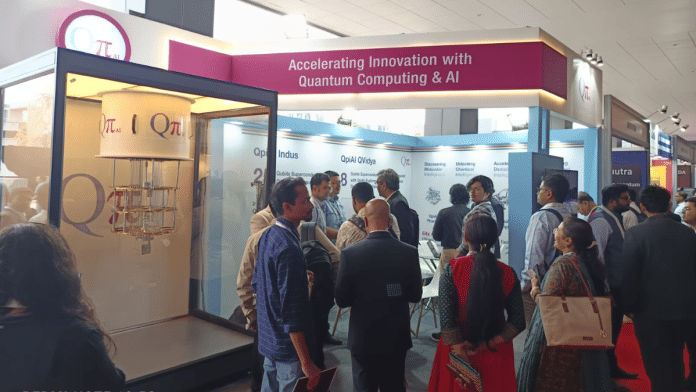Bengaluru: Bengaluru is set to take a giant step towards realising its dream of a $20 billion quantum-driven economy in Karnataka by hosting India’s first ever quantum summit over two days from Thursday.
“Our idea is that the majority of things should be indigenous and need not depend upon other countries. So in that way, the government of Karnataka is prepared to support all entrepreneurs and some foreign investors,” said Karnataka’s Science and Technology Minister N.S.Boseraju on the eve of the summit, which is part of the $20B Quantum Action Plan unveiled by the government last week.
It envisions an ecosystem that will bring academia and industry together through investment in research, development, and policy.
Karnataka’s rivalry with Andhra Pradesh has amplified conversations around the summit. Early this week, in a social-media stand-off, the two governments threw claims at each other regarding which state has the nation’s first quantum computer. On 25 July, Andhra Chief Minister N.Chandrababu Naidu announced on X that Amaravati would have “India’s first indigenously built 8-qubit quantum computer” by November built by quantum technology start-up QpiAI.
Boseraju responded immediately asking Naidu to stick to the facts, saying that QpiAI has already built and commercialised India’s first quantum computer in the 8-bit and 25-bit categories. Incidentally, QpiAI is a Bengaluru-based startup.
Companies like IBM, Google and Microsoft are in the race to build quantum computers.
“As far as QpiAI is concerned, we are getting to a fully indigenous quantum computer, except for the dilution refrigerators. We will manufacture, fabricate all of the chips in India and take away the surprises that come due to the supply chain issues,” Kanishka Agiwal, vice-president (sales) at QpiAI, told The Print.
Bengaluru already has one quantum computer operational centre which is working.
Agiwal sees the summit as a big opportunity to involve multiple stakeholders such as entrepreneurs, scientists from academia, and policy makers to come together to understand the gaps and challenges in building a quantum technology ecosystem at scale.
“Academia cannot drive if there is no commercialization of their technologies. And industry cannot move forward if there aren’t breakthroughs that are provided from policy interventions and talent. So it’s a very symbiotic way of getting all of that together and getting everybody onto the same page, excited about it, telling them the awareness, and also telling them what is out there,” he added.
Also Read: IIT-M director has a piece of advice for investors—play the long game, deep-tech needs time
Quantum park underway
The summit is designed to address key areas of social structure and the technological sector such as diagnostics, finances, national security where technology can be revolutionary in future.
“The purpose of the summit itself is to give exposure to the venture capitalists and investors to see where the technology status is so that they are more confident to put the money in,” said Arindam Ghosh, the convenor of IISc’s Quantum Technology Initiative (IQTI) and the convenor for the summit.
The event, according to Ghosh, will also be an awareness movement in sectors such as defense as well. For instance, focus is also on Defence Research and Development Organisation’s role in amplifying quantum technology in strategic sectors through computing, communication, and sensing with strong security implications through showcasing industrial and hardware updates at the summit.
More investment in the deep-tech field will help India’s semiconductor chip procuring challenge without compromising the security. According to Ghosh, the chip itself is quantum benign, as security risks arise during data transmission rather than at the chip level. Usually the agents target communication channels as opposed to chip hardware.
Adversaries usually target communication channels, not the receiver or chip hardware. So, as Ghosh puts it, hacking during data transfer remains a serious concern in a growing geopolitical context where India should develop quantum entanglement based hack proof communication channels.
“So getting a chip is not an issue. But we have to create a hack proof network of communication,” Ghosh added.
From a strategic perspective no country is fully ready to share its most advanced technology with its counterparts. Hence, as Akshay Naik, co-convenor of IQTI puts it, India cannot afford to not develop a fully indigenous technology especially in defense sectors. “I don’t see how we can call ourselves a good economy without having this indigenously built (technologies). We had a meeting with the Karnataka government on developing a road map,” he said.
Beyond quantum computers
There are also other concerns regarding sensors, secure communication networks, and advanced medical diagnostics which require efforts beyond building processors for quantum computers such as finding ways to manufacture cables and detectors needed for quantum computers.
“If we do not manufacture those here, anyone can block it and say, look, we will not sell these to India and then we have to at that point start the manufacturing,” Naik said.
For instance, quantum computers operate at near-zero temperatures, requiring specialised equipment like dilution refrigerators costing around Rs 10 crore. Now, as there are no Indian manufacturers, companies like QpiAI imports it. According to Naik this dependence on foreign suppliers creates strategic vulnerabilities which also needs investment from potential venture capitalists (VCs).
Many Indian VCs recognise quantum technology’s potential. But according to Naik, India’s start-up ecosystem predominantly remains software-dominated, like IT services or apps that grow faster like Swiggy or Amazon. But deeptech like quantum computing or technology usually doesn’t match with the growth of a software as service (SAAS) company as it requires awareness among VCs as well as entrepreneurs.
“Our hope is we will be able to have this conversation (at the summit) of what our expectation is, what is the support that we are looking at and maybe the VCs can also tell us how they perceive it (and) what are their expectations,” Naik added.
(Edited by Tony Rai)
Also Read: What’s stopping India from building its AI models? Experts list a host of challenges






